Search
Showing 10 of 1803 results for NARSC 2016 July student registration fees
-
Around the world in five
Asia
While financially strained institutions in the U.S and UK reassess their models, Asia’s universities are reshaping global higher education, leveraging innovation and collaboration to address economic challenges. The shifting dynamics carry profound implications for how knowledge is produced, shared, and valued, raising the question of how it will ultimately redefine higher education worldwide.
Australia
The Department of Education in Australia has released six new guides and an overall framework to support innovative practice in international student engagement, covering areas such as mental wellbeing, community engagement, developing innovative programmes and supporting with accommodation.
Mexico
Study travel agents in Mexico are expecting a diversification of outbound trends in the year, while it is hoped that business to the traditional top destination of Canada will settle after a challenging year of policy changes and visa issues, according to delegates at the recent ST Alphe Secondary Focus Mexico City event.
New Zealand
News Editor of StudyTravel Network, Matthew Knott, shares comments from Executive Directors of English New Zealand and SIEBA, Kim Renner and John van der Zwan, along with Keri Ramirez, Managing Direcotr of Studymove on New Zealand’s international education recovery. A recent industry seminar on industry data claimed full recovery could come in 2025.
Sri Lanka
Perth-based Curtin University has officially launched a new branch campus in the Sri Lankan capital of Colombo. After establishing similar facilities in Singapore, Malaysia, the UAE, and Mauritius, Curtin University Colombo is the institution’s fifth global campus.
-
Advertising opportunity for Japan’s 2025 New Zealand Study Guidebook
The KBUNSHA New Zealand Study Guidebook is a trusted publication and is the only one of its kind supported by the New Zealand Embassy in Tokyo and Education New Zealand Manapou ki te Ao (ENZ). KBUNSHA distributes 20,000 copies of the study guidebook to Japanese schools, universities and education organisations as well as education fairs and seminars.
ENZ Business Development Manager – Japan, Tomomi Kontani said advertising here is a great opportunity to leverage an increased demand for information on New Zealand’s education offering.
“We are continuing to see significant interest in New Zealand as an education destination from students and their parents, schools, and education agents here in Japan” she said.
“This is a great opportunity to showcase what makes New Zealand unique, especially in the regions. Destination marketing plays a key role in student attraction for a market like Japan with a tourism focus,” Tomomi added.
The guidebook’s last edition was distributed at the annual student fair and stakeholder focus events hosted by ENZ Japan. The events attracted around 1,000 people. The guidebook remains the main information source ENZ refers to and distributes at upcoming events in 2025.
Advertisement rates for individual providers range from approx. $2,560 NZD to $6,120 NZD for guidebook and or website listings. With the ‘Premier Plan’ and ‘Advertorial Plan’, the school logo will be listed on the new scholarship campaign page built by KBUNSHA. Individual providers can download the proposal here. Advertising copy can be provided in English.
For regional groups, download the proposal here for further details on the guidebook and pricing (approx. $2,200 NZD for a two-page colour advertisement and $3,300 NZD for a four-page colour advertisement).
Bookings must be made by 27 June 2025 directly with KBUNSHA. For more information, visit the KBUNSHA website here. The 2024 guidebook can be viewed here.
KBUNSHA contact:
Minori Takahashi (Director)
Tel: +81-3-3234-1744
Email: minori@kbunsha.com
-
Message from Amanda Malu, Chief Executive
Tēnā tātou katoa,
We have been deeply saddened to hear of the tragic death of Kyle Whorrall, an international student from Waipapa Taumata Rau, the University of Auckland over this Easter weekend.
Kyle moved to New Zealand in 2021 from the United States as an international PhD student studying entomology in the university’s School of Biological Sciences.
He is fondly remembered by family, friends and colleagues as a gentle, kind soul and a dedicated entomologist who was a rising young scientist in his field.
Our thoughts and aroha remain with Kyle’s whānau and friends in the United States and New Zealand, and the wider community at the University of Auckland and Manaaki Whenua Landcare Research at this trying time.
Ngā mihi nui,
Amanda Malu
Chief Executive
Education New Zealand Manapou ki te Ao
-
Successful agent engagement and student recruitment drive in Malaysia
The events aimed to gauge student interest in studying in New Zealand and deepen collaboration with education agents and schools.
To kick off the series, in early March, ENZ and representatives from New Zealand universities co-hosted a morning tea information session and focus group for Malaysian education agents in Kuala Lumpur.
The session promoted the ENZ resources available to support agents, and representatives from University of Auckland, University of Canterbury, Massey University, University of Otago, and University of Waikato led a discussion exploring key messages that resonate with Malaysian students and parents, understanding the factors influencing destination choice and brainstorming strategies to strengthen New Zealand’s brand visibility.
The event brought together 11 agencies from across Kuala Lumpur.
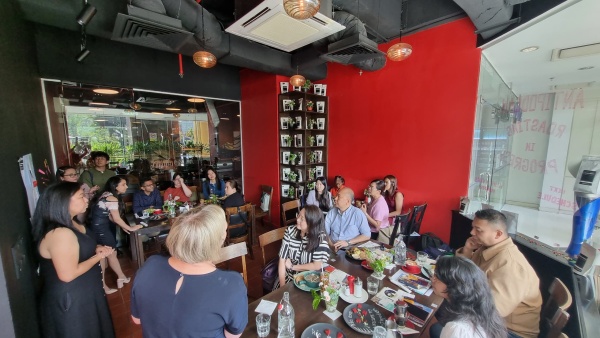
Co-funded agent activity
ENZ supported three key education agencies from across Malaysia to undertake co-funded student recruitment activity.
In Selangor, AECC Global Malaysia and ENZ hosted a mini-booth fair at HELP International School – giving students the opportunity to interact directly with representatives from Auckland University of Technology, the University of Auckland, the University of Canterbury, University of Otago, and the University of Waikato.
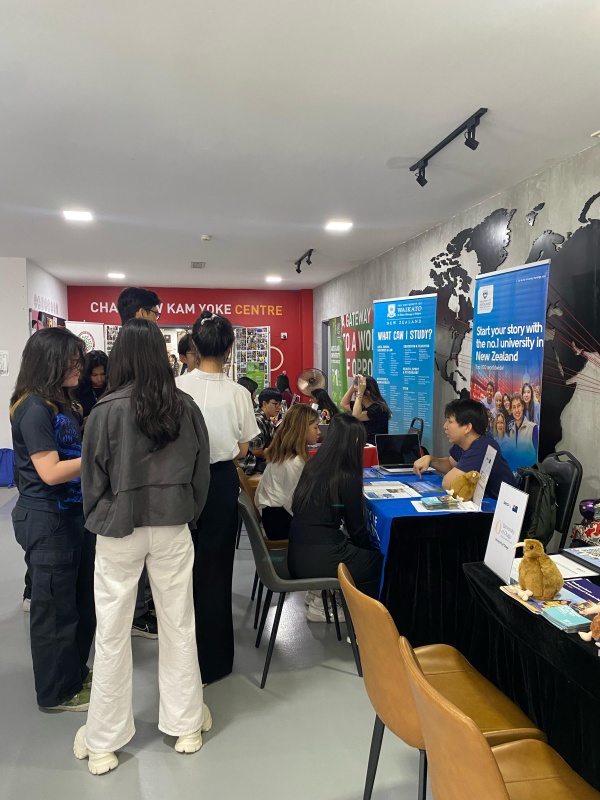
The mini-booth fair at HELP International School.
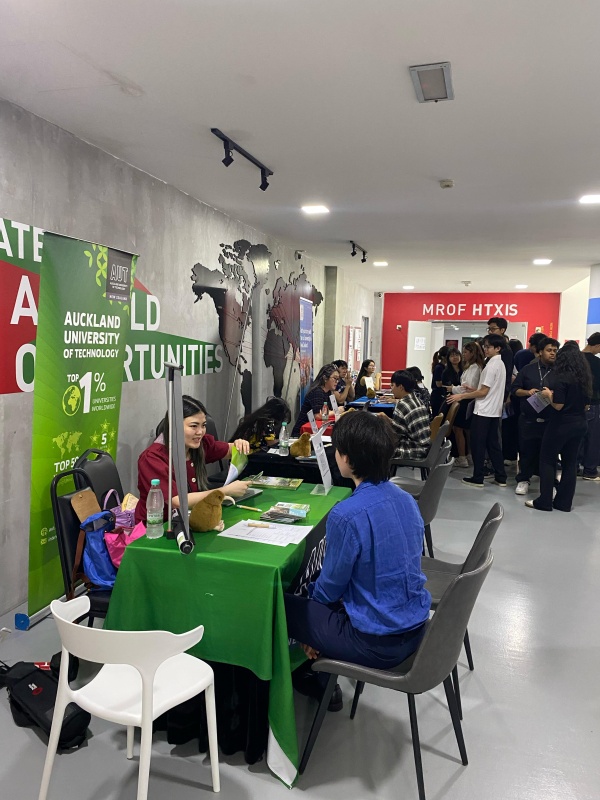
The mini-booth fair at HELP International School.
Over to Shah Alam, SELSET Education partnered with INTEC College to host an information session showcasing eight of New Zealand’s tertiary institutions.
INTEC College students heard from the Auckland University of Technology, the University of Auckland, University of Canterbury, University of Otago, University of Waikato, Southern Institute of Technology, Nelson Marlborough Institute of Technology and pathway provider, University of Canterbury International College.
Around 100 students were in attendance, and the session was followed by an opportunity for students to chat further with the study providers on show.
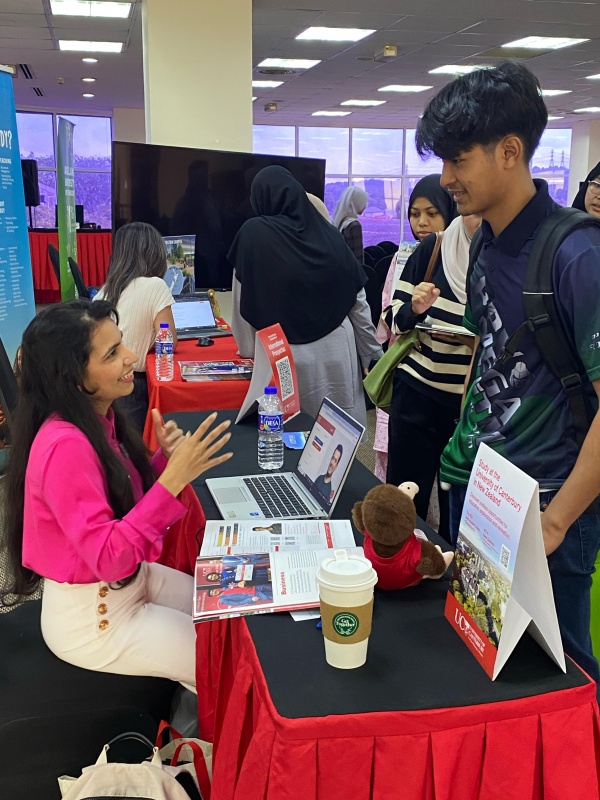
Students at INTEC College exploring New Zealand tertiary education study options.
To close out the co-funded activity, ENZ made its first official visit to East Malaysia since before the pandemic.
ENZ and JM Education partnered to lead a series of school visits in late April Kota Kinabalu, Sabah.
Around 400 students attended information sessions across three schools. The events were led by the University of Auckland and University of Otago at Kota Kinabalu High School, Sekolah Menengah Sains Sabah, and Maktab Nasional.
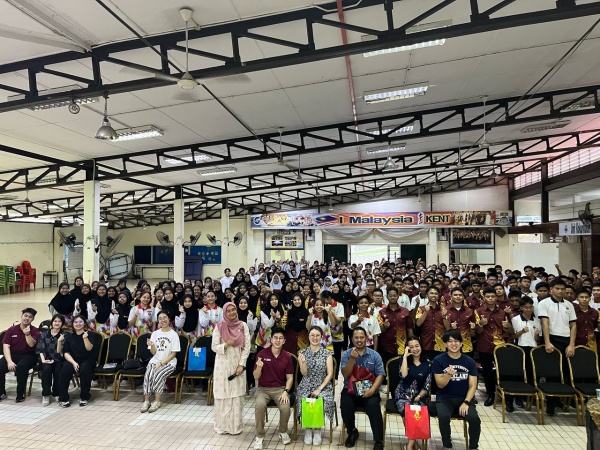
Attendees of one of the information sessions.
ENZ Market Manager for Indonesia and Malaysia, Naluri Bella, said that partnering with agents for co-funding targeted activities helps enhance both agents and students’ awareness and understanding of New Zealand’s unique education offering.
“These collaborations not only build trust and commitment among agents but also positions New Zealand as a competitive and credible choice for Malaysian students,” she said.
-
Aotearoa sharpens Sherpa’s ambitions on conservation in Nepal
The Everest region of Nepal is his home, and he has seen first-hand the impact of climbers and climate change on the world’s most famous mountain environment.
The former international student to New Zealand is a columnist in the Kathmandu Post, readily highlighting successes and calling out failures on a range of environmental issues impacting Nepal. He is part of a generation determined to find solutions.
Tsewang recently completed his Master’s in Environmental Management at Lincoln University, an international education experience made possible by the Mingma Norbu Sherpa Memorial Scholarship. Mingma was an early graduate of Sir Edmund Hillary’s Khumjung School, an alumnus of Lincoln University, and one of the leading voices on conservation in Nepal and Bhutan through his work with World Wildlife Fund (WWF) before his untimely death in 2006.
His legacy is a scholarship jointly funded by WWF, Lincoln University, and the Greater Himalayas Foundation which supports students from remote regions of Nepal committed to careers in conservation to study at Lincoln.
Tsewang says the links with New Zealand which date back to the work of Sir Edmund Hillary, and his belief in the importance of education for future generations, are a driver for many Nepalese students seeking to improve their opportunities in life.
“The connection is very strong,” he says. “Sir Ed Hillary is such an icon and I feel that the students who come to New Zealand to study are continuing to strengthen the relationship established by Sir Ed and Mingma”.
Fulfilling the dream of a New Zealand education
“The scholarship allows you to fulfil a vision of having a higher education in New Zealand, but more than that, it connects many people already working in the conservation sector in New Zealand, Nepal, and other parts of the world.”
Tsewang spent two years in New Zealand, arriving just before the border closed in 2020 and is grateful that his studies were largely unaffected by the pandemic. He says he has learned much about New Zealand’s approach to conservation and gained a better understanding of te ao Māori and the concept of kaitiakitanga (guardianship and protection).
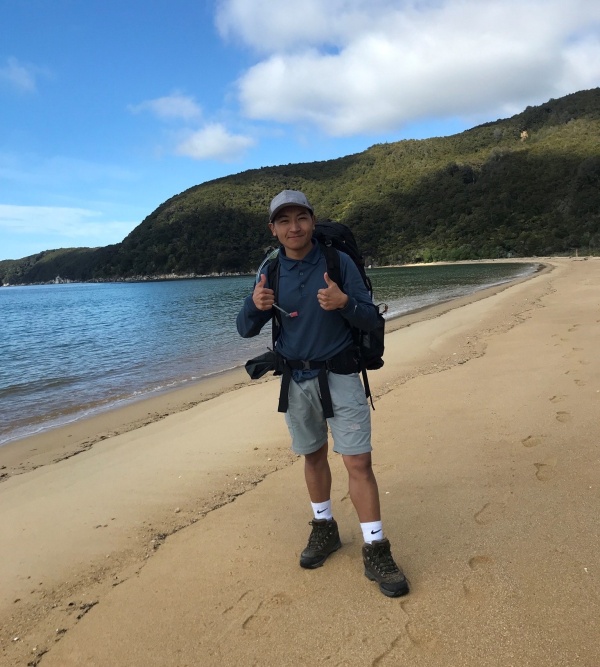
“I am a Sherpa. We are renowned as mountaineers, but we are also an ethnic tribe with a strong connection and respect for nature and a strong desire for environmental stewardship.
“Seeing Māori taking ownership of preserving and retaining their culture was an important learning for me. These are taonga (treasures) which we should be taking from one generation to another.
“Through my education I want to promote empowerment of local people on conservation issues,” Tsewang says. “Studying in New Zealand made me realise that this is already happening in Nepal, but we just need to find ways to make it more effective.”
Tsewang’s Master’s research was into the effectiveness of the Garbage Deposit Scheme (GDS) initiated by the Sherpa people, in which Everest climbers pay a US$4000 deposit that’s returned only if they bring back at least 8kg of rubbish produced during their expeditions. “Working in conjunction with the aims, aspirations, and opportunities of local communities is incredibly empowering.”
Making a positive impact in Nepal
The students who have come to Aotearoa have made a positive impact in Nepal, Tsewang says. “It’s all about learning from best practice and sharing knowledge.
As one person it’s hard to make change, but by sharing information and knowledge we can make incremental change.”
“We are seeing that governments globally are starting to overhaul their environmental protection policies. New Zealand has played a key role in the context of Nepal because people before me came to study and returned home to build crucial environmental education and awareness.”
Tsewang loved his time in Aotearoa, both inside and outside the classroom, having spent most of his free time hiking iconic tracks. “There’s so much learning that happens out in the field where you hear first-hand of the experiences of those working in conservation.
“This was an essential part of my education experience. You have unplanned conversations which are inspiring and hugely valuable,” he says.
“The last two years have been monumental in so many ways. It’s not just the academic learning, but also the personal growth. I have gained so much confidence to voice my opinion and share my knowledge.
“I will stay in touch with many of the people I have met and hopefully we will have the opportunity to collaborate in the future. Learning never stops.
“The international education opportunities with New Zealand only serve to strengthen the long-standing bond with Nepal. There’s a real legacy involved for both countries.”
-
Caroline plays her part in Christchurch rebuild
But she is now a qualified quantity surveyor as comfortable working on building sites as she is back in the office crunching the numbers.
Caroline says it is not a profession she would have contemplated in China, where she grew up, but Christchurch’s rebuild inspired her to pursue a career in the construction industry and she is grateful for the freedom to be able to achieve her ambitions.
“It has been very rewarding to be part of the rebuild and to see the changes in the city. Bettabuilt, the company I work for, specialises in school rebuilds. When we finish a new school, you feel like you’ve done something you should be really proud of.”
And her parents are proud too. They have backed her career choice and know that the bold decision they made to send their only child to New Zealand for education was the right one.

New Zealand a safe place to study
Caroline says they had travelled widely as a family before making the decision that she would come to Burnside High School Te Kura o Waimairi-iri in Year 11. “They wanted me to be open-minded and take on new experiences and cultures,” she says. “They decided it would be good for me to study in another country with a different culture and chose New Zealand because it was a peaceful and safe country.”
Before she arrived, Caroline was set up with a “buddy”, a student from her school in Beijing who was already studying here and helped provide insights into life in New Zealand. She also took an online course prepared for international students.
“This made me feel more confident and familiar with what I was coming to which was important, because the culture and environment is quite different from my home country.”
But there were still some big adjustments to be made when it came to schooling. “All courses in China are set by the Education Department. In New Zealand, you have freedom to choose your own courses,” she says. “At first, I was a bit overwhelmed by the options available to me because I didn’t know exactly what I should take. But it was good that I had the opportunity to try courses that I was interested in.”
She also had to get used to a self-directed approach to learning. “It allows you to study in a way which suits you best, which was positive for me. And it means when you start work you have the ability and discipline to study by yourself. I have used methods I learned in high school and university to build my knowledge in the workplace.”
With more free time in her life, Caroline had the opportunity to play sport and even take on a part-time job which she says would not have been possible in Beijing. “That job really helped me because I got to practice English and gain more confidence talking to local people.”
New career opportunities
It was all part of an international education experience which Caroline believes is about much more than study.
“When you’re an international student, you quickly acquire life skills and become much more independent.
You also learn about other cultures because you are mixing with people from many different backgrounds. It was quite an eye-opener for me, but I enjoyed it.”
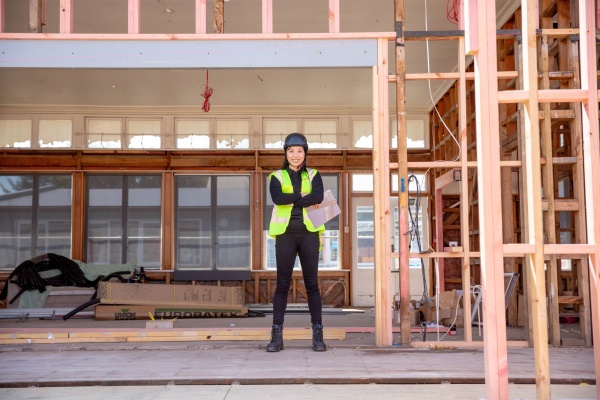
Once she determined her career choice, Caroline chose Ara Institute of Canterbury as the next step on her education pathway. Starting with a Diploma in Quantity Surveying, she followed it up with a Bachelor of Construction. Job and internship opportunities were regularly shared by their programme leader, illustrating the close ties with business.
The decision to study in New Zealand has taken Caroline on a journey she couldn’t have imagined when she arrived. “In China I would not be working in construction. I would probably have been working in finance or management,” she says. “The environment here changed me and gave me career options I would not have considered at home.”
In the past few months Caroline has secured residency and bought her first house, giving her a real sense of belonging. “I enjoy my work and my life in New Zealand. I love Christchurch and I’m proud to be contributing to the rebuild of the city.”
“I feel really happy that I came here.”
-
Charan overcomes obstacles to finally return to New Zealand study
Having to dig deep to overcome the disruption to his education caused by the Covid-19 pandemic, he recently returned to Lincoln University to pick up where he left off. He is part of the second cohort of 1000 international students able to come back to New Zealand to complete their studies after being caught offshore when border restrictions began in March 2020.
As Covid spread, the Indian student was recalled to New Zealand only six weeks into his semester exchange at Wageningen University in the Netherlands, but our border closed while he stood in line at Amsterdam’s Schipol Airport.
“It was pretty tense,” he says. “The flight I had initially booked was cancelled, so I had to book the next earliest flight which was at 7am the next day. I reached the airport around 2am but while waiting for my boarding pass, I received a call from New Zealand asking me not to board the flight as the borders were closing that night.”
Charan could not even get back to India, as the airports he would need to transit in were closed. At the time, he was in the third year of his Bachelor of Agricultural Science degree, with one year left to complete.
He says the staff at both universities were super-helpful and after many flurried emails and calls, it was agreed he could return to his studies at Wageningen. With no sign of the border opening in June he was granted permission to stay until the end of the year, and he managed to secure an extension to his Erasmus scholarship which funded his living costs.
“I decided I was going to treat what was happening as an adventure”
Covid disruption a stressful time
But the disruption came at a price. The high-achieving student failed his first test after the stressful experience at the airport. “It took me some time to accept what had happened. I just couldn’t focus on study.” But his second attempt was successful, and he never looked back.
“I decided I was going to treat what was happening as an adventure, and to make the most of my time in the Netherlands.”
By the end of 2020, Charan was still unable to return to New Zealand and he made the decision go home to India. “The first four months were pretty chaotic, but I was really blessed I could be with my family.”
He didn’t know how long he would be in India but was committed to getting back to Lincoln to complete his degree. “I didn’t want to study remotely. I decided it was better to have time off and then return to do my Honours year.”
In the end, it took another year and multiple attempts at securing a place in MIQ before he could return to New Zealand. “When they brought in the lottery system, I had to wake up at 3am each week to log in and try and secure a place. I’m still trying to look at the experience positively and I know that I have stories to share in the years to come!”
Charan arrived back in Christchurch in January and is excited to be underway with his Honours year. He is working with Professor Clive Kaiser at Lincoln University’s new Centre of Excellence for Potato Research and Extension.
Potato research of value internationally
He is researching the development of a rapid test for the identification of Candidatus Liberibacter in potato leaves and tubers. The bacterium causes Zebra chip, a disorder of potatoes which creates distinctive stripes in the flesh and poses a threat to commercial potato growers. Rapid identification of affected plants in the field will help reduce cost and wastage for the $1 billion potato industry in New Zealand.
“I was keen to be involved in this research because I like solving problems and this is a real-world problem with big implications here and overseas,” Charan says. “Potatoes are grown all around the world and almost every culture uses them as a staple part of their diet. So, this research will be of value internationally.”
Charan is eyeing a future in vertical farming, an intensive form of horticulture where crops are grown in trays indoors under controlled conditions and he hopes to one day run his own business.
He says studying at Lincoln has been “an amazing experience” where he has made friends with New Zealand students and other international students. “I learned a lot about different cultures from them.”
Charan describes the challenges that Covid has thrown at him as “daunting” but says that overcoming them has made him more resilient. He is grateful to be back on track with his international education in New Zealand, a place which “keeps you grounded and allows you to focus on your study”.
-
Fermented flour a food waste breakthrough
Ninna Granucci, a former University of Auckland international student, is part of a new generation of thinkers contributing solutions with out-of-the-box thinking.
Ninna grew up in Brazil and saw for herself the amount of food waste primary producers there generated. Learning about the scale of the problem globally, she resolved to apply her skills to help bring about change.
“I wanted to use science in an area which fascinates me –microbiology and specifically, fermentation – to try and find a solution to this huge problem.”
University of Auckland a great place for new ideas
Ninna chose to study for her PhD in Biological Sciences under Dr Silas Villas-Boas at the University of Auckland in 2014. “The university environment was a great place for new ideas, to promote the spark to find solutions to problems, with the scientific approach to support it.”
It clearly worked. After only 18 months, she had a breakthrough in the lab which she knew could make a real difference. She refined a fermentation process to successfully convert waste pulp and peel from selected fruit and vegetables into a nutritious flour. Widening the range of ingredients in her trial, she proved she was on to something.
Data from the UN’s Food and Agriculture Organisation (FAO)shows that almost 32 percent of plant-based product is wasted annually. Ninna’s technology has the potential to make substantial progress on this.
It turned out that the ingredients also tick all the boxes for health and sustainability-conscious consumers: high protein, high fibre, low calorie, gluten free, rich in vitamins, minerals and natural antioxidants. And the bonus is that they also have lowest CO2 footprint compared with other ingredients in the market today.
Entering her prototype into the University’s Velocity 100K Business Idea Challenge sparked media interest and a flurry of inquiries from supermarkets and other businesses wanting to buy the product. “That was when we realised it was not only an academic project but also something which could be much bigger and could help to address the problem of food waste,” Ninna says.
Green Spot Technologies has global plans
With support from Velocity, she and Silas co-founded sustainable food innovation company Green Spot Technologies, which has ambitious plans to go global. Ninna is now CEO and based in Toulouse, France, where the business is established in a start-up accelerator environment and employs 15 people.
But back in the early days, it was pretty nerve-wracking. “My plan was to complete my PhD first and then set up a company based around the project. But after the success in the Velocity Challenge, we decided the time was right to forge ahead with the start-up. It was quite challenging. My background is all scientific, I didn’t have any experience in business, and I had a lot to learn.”
She is grateful for the support she got at the University of Auckland and believes that her career path would never have progressed as quickly if she hadn’t chosen New Zealand as a study destination.
“I give a lot of credit to New Zealand for how things worked out”
“New Zealand was the catalyst,” she says. “I managed to secure a scholarship through Callaghan Innovation available to students looking to add value to waste streams. It allowed me to focus on the work and find opportunity. I give a lot of credit to New Zealand for how things worked out.”
Ninna worked in Auckland with other international students from around the world and says that, too, helped contribute to her success. “When you are in the same situation you can support each other and that was super important during my PhD.”
New Zealand education the right decision
Ninna remains passionate about sustainability and reducing food waste. It is at the heart of her business and is important to her personally. The mission of Green Spot Technologies is “challenging the food waste paradigm to feed the future”. The company has won multiple awards, both in New Zealand and in Europe, highlighting the unique nature of its technology and products.
With food insecurity spreading to hundreds of millions of people around the world, the UN has set a Sustainable Development Goal (SDG) to halve food waste by 2030. It is an ambitious target and needs innovative thinkers like Ninna to make it achievable.
“I think it is incredible that we waste so much food, knowing that we need more food in the world. It doesn’t make any sense, but it motivates me to work on solutions,” she says.
The decision to study in New Zealand was a critical part of Ninna’s journey from international student to international businesswoman and innovator. “I could not have imagined that it would lead to such huge changes in my life in such a short time,” she says.
“A New Zealand education provides a truly enriching experience. I really think I made the right decision.”
-
From Russia to New Zealand: "I've lived two different lives"
Home was Petropavlovks-Kamchatsy, on the far eastern seaboard of Russia, almost 7000km from Moscow, and the decision to leave was a relatively spontaneous one. “The whole experience was pretty surreal.”
He was introduced to the possibility of an education experience in New Zealand by ACG (Academic Colleges Group), which held a fair in his hometown back in 2008. “I had never heard of them visiting Russia before, let alone my hometown as it’s so remote.”
Andrey admits that at the time he wasn’t keen to stay on in Russia and “jumped at the opportunity” to come to New Zealand for a six-month stint in Year 13 at ACG Parnell College.
“Looking back on it, I really wanted to go somewhere far from home and different. I placed all my hope on it being a better place and it turned out that it was. That internal drive to explore took over and I followed my intuition.”
Student life provides connections
Having improved his English, Andrey went on to study for his Bachelor of Commerce in finance and economics at the University of Auckland, where he found his tribe. “Life in Russia did not resonate with me in the way that life in New Zealand did,” he says. “I think what was missing for me at home was the kind of openness and connectivity which is so apparent here.”
Coming to New Zealand I was exposed to other people’s perspectives and backgrounds, and I really connected with that.
"I felt a sense of belonging and that I could be who I am without judgement. Breaking away from being expected to fit a certain mould at home was a big thing for me.”
With new-found confidence and his degree completed, Andrey travelled the world on modelling contracts before “returning to the original plan” and establishing a career in e-commerce and project management.
And he has the perfect credentials for his current role at The Mind Lab, helping to launch Mission New Zealand, an online education portal aimed at international students. “It provides short courses and micro-credentials as a taster of what education in New Zealand is like and what it can provide. It’s a full circle moment for me.”
Mission New Zealand highlights what makes an education experience in Aotearoa unique through the lens of creativity, sustainability, tech innovation, and culture. “I think it puts us on the map in terms of global education.”
Looking back, Andrey says he would have loved the opportunity to access a platform like this as a student travelling to a foreign country, “to really get an understanding of what it’s like on the ground”. He says he is excited to see what impact Mission New Zealand can have.
Life-changing move
The decision to leave Russia for New Zealand has been life-changing for Andrey. He is now a citizen and knows his future lies here. “There is so much social and career mobility here and that’s exciting for me.”
He arrived determined to carve out a new path in life and he has certainly achieved that. “I have grown into a person who is more confident and assured, and not afraid to explore new opportunities.”
He now has plans to explore and better understand the significance of te ao Māori. “I want to immerse myself in that space. I love that in New Zealand there is more than one way of seeing the world. It is so important that there is an alternative perspective,” he says.
“I would like to get a deeper understanding of the tenets of te ao Māori, to see the challenges we are facing and the potential solutions through a different lens.”
His advice to students considering coming to New Zealand is to get fully immersed in the culture “and absorb it all”. “Don’t come to recreate what you had at home. If you do, you’ll miss huge opportunity for personal growth.”
Andrey says his life now looks nothing like his old life. “It’s like I’ve lived two different lives.” And he’s not done yet.
“Coming to New Zealand has drastically changed how I view myself in the world,” he says.“ Through international education you realise that your actions do matter, that you do have the potential to make a real impact. You start seeing yourself as an individual in a connected system.”
“Keep exploring is my motto for the future.”
-
International students cap off education experience with Mural
Three students have rounded off their international education experience in Aotearoa New Zealand by teaming up with respected artists and local iwi to create a large street-side mural which celebrates the culture and diversity of Tāmaki Makaurau, their host city.
In the first collaboration of its kind, international students Nikita Sharma from Unitec, and Celia Lee, and Jenny Zhong from Auckland University’s Elam School of Fine Arts, were chosen to design and paint one panel of a three-panelled mural after Study Auckland invited art students from tertiary institutions across the city to join the project.
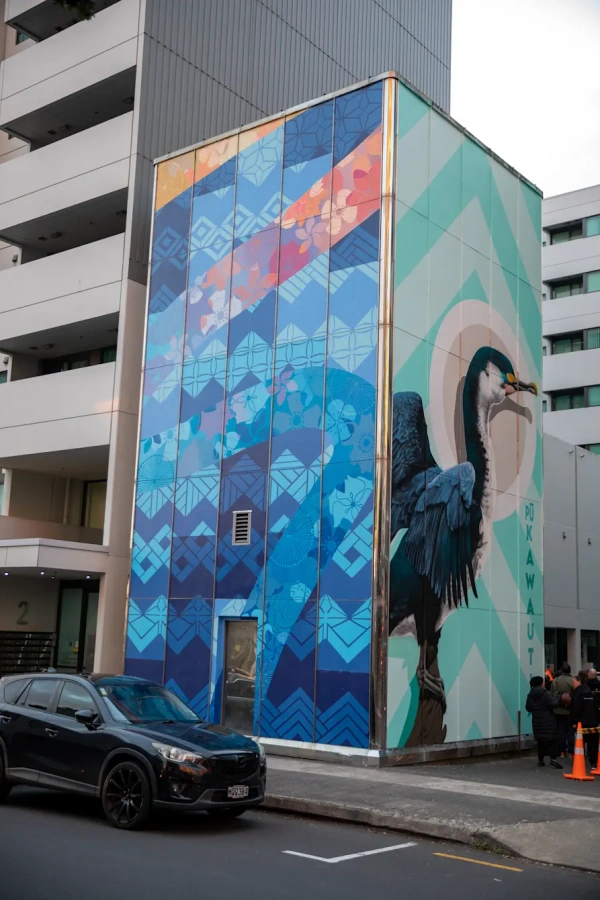
Nikita, who came from India to study in New Zealand, enjoyed working on the project along with Chinese-born New Zealander Jenny and Taiwanese international student Celia. “Our panel depicts diversity, inclusion and culture,” she says. “The project has given us the chance to give something back to the city and to the people who have welcomed us. We hope people feel a sense of connection to the artwork.”
International students were given the opportunity to connect with local iwi
The aim of the Study Auckland panel was to give international students the opportunity to connect with local iwi and work with respected local artists, including Hana Maihi of Ngāti Whātua Ōrākei, to explore what it means to make public art in New Zealand.
To help with the design process, the students joined Hana in a three-day wānanga at Ōrākei Marae to immerse themselves in Māori history, and learn about the significance of the mural’s location in Te Tōangaroa, on Ngāti Whātua Ōrākei owned land.
Study Auckland business development manager Beth Leyland, who led the project, is thrilled with the outcome and says the students are too.
“Auckland Unlimited’s Head of International Education Henry Matthews says the project truly reflects the principle of hospitality amongst the diverse cultures that make up our collective world right here in Tāmaki Makaurau.”
The students’ panel was funded through a $20,000 grant from the Ministry of Education’s International Student Wellbeing Fund. The other two panels were designed and painted by Hana and Te Whetū Collective member Poi Ngawati to bring awareness to the rich Māori heritage and taiao (environment) on which the city was founded.
Collectively, the three panels depict the importance of welcoming different cultures and diversity in Tāmaki Makaurau.
The vibrant 12-metre-high mural, incorporates elements of biodiversity which were once part of the landscape of the area. The students’ panel includes the poutama, a well-known step-like pattern seen in tukutuku panels adorning the walls of wharenui.
In 2019, 115,713 students from 180 countries enrolled to study in Aotearoa New Zealand, and became part of our communities. This injected $4.9b into our economy and supported more than 48,000 jobs. Just over 63,000 of those students were based in Tāmaki Maukaurau. The city currently hosts just under 13,000 international students.

